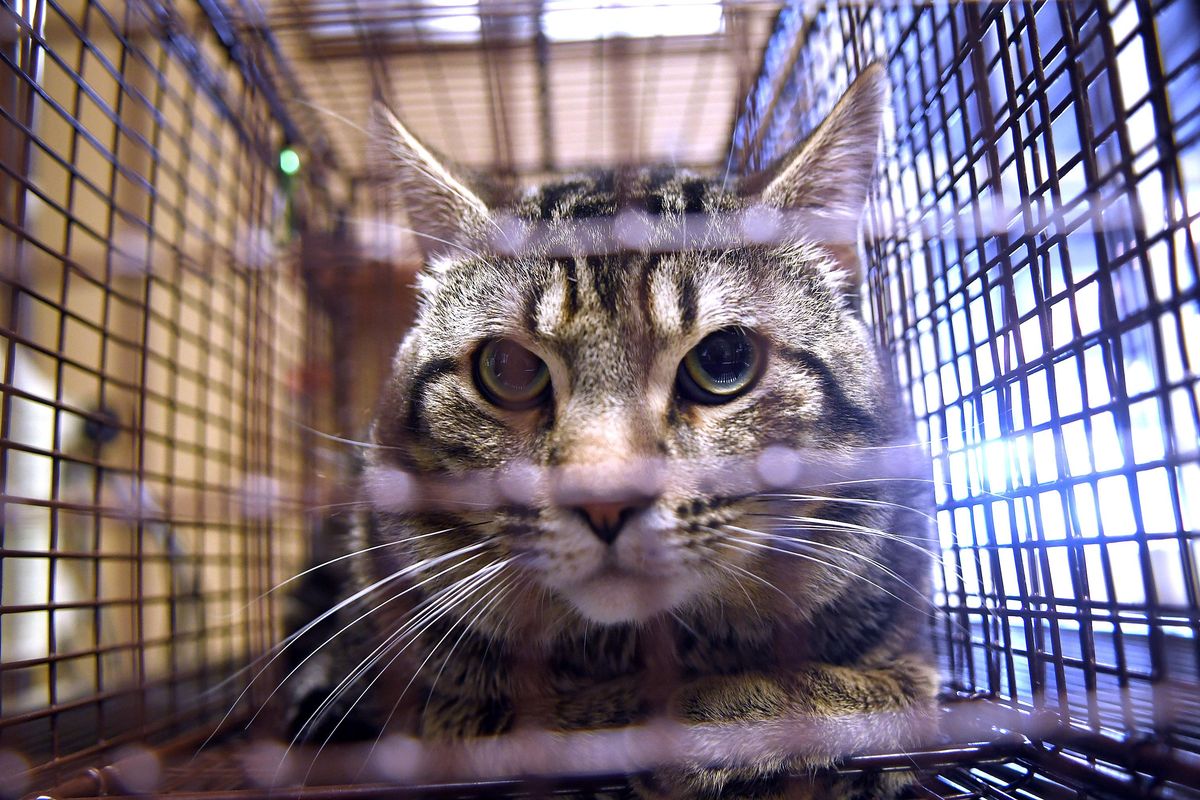Fixed on cat overpopulation: Pet Savers will spay or neuter and vaccinate stray cats for $25

Part of the mission of Pet Savers is to perform spay and neuter operations on animals to keep the pet population under control – after all, they’ve done over 65,200 surgeries since 2005.
They’ve come up with a new program to make it even easier for people dealing with feral or “community” cats. Anyone who brings in a cat they’ve trapped can get the animal either spayed or neutered and fully vaccinated for only $25.
On a recent day two cats had been dropped off, both males. They sat in covered wire cages in a room filled with the soundtrack of chirping birds. “It tends to keep the cats calmer, so they don’t hear the dogs next door,” clinic manager Stephanie Napier said.
The cats had been given name tags attached to their cages directly above a sign urging caution. Snugglies, a large tabby, seemed cool and collected, but a black-and-white cat named Trip hissed whenever someone touched his cage.
Some of the cats that are trapped and brought in are pretty friendly, Napier said. “Some come in looking pretty beat up and some look pretty healthy,” she said.
If an animal is sick or injured, the veterinarian on staff will treat them, Napier said. They will usually ask the person who dropped the animal off to pay for the extra treatment.
The new TNR (Trap-Neuter-Return) program started this month and a dozen cats had been fixed and vaccinated by midmonth. Pet Savers provides the cat traps, which are $75 to rent for two weeks. However, once the trap is returned, the $75 fee is fully refunded.
Surgeries are performed Tuesday through Saturday and people are encouraged to drop cats off by 9 a.m. to ensure they can been seen that day. People are asked to keep the cat indoors for 24 hours after surgery because cats cannot regulate their body temperature after anesthesia.
The tip of each cat’s left ear is snipped off while they’re under sedation to show that the cat has been fixed and vaccinated, said Napier. It doesn’t bother the cat after it’s done and it’s important to mark the cats somehow so someone else doesn’t put them through the stress of trapping them. Normally animals are given a small tattoo near their genitals to mark if they have been spayed, but that doesn’t do any good with feral cats, Napier said.
“If you have a feral cat you’re not going to grab them, flip them over and look for a tattoo,” she said.
Pet Savers did not receive a grant that allows the cheaper pricing, Napier said. The clinic is hoping to break even on most surgeries, but they know they will likely lose money on some animals, she said.
“If people are willing to do the work, we’re willing to meet them halfway and give them a discount,” she said.
Fran Wells was happy to see the new program. She’s been trapping feral cats in her neighborhood for years. It’s gotten to the point that clinic staff recognize her car and have her account pulled up before she walks in the door. “I have taken a lot of cats there,” she said.
She used to pay $90 to spay a female cat and $50 to neuter a male. “It gets a little pricey,” she said. “It just will help save my pocketbook.”
She lives in the North Central area near a lot of renters and sometimes people abandon their cats when they move out. Wells has turned her fenced back yard into a cat sanctuary, complete with several small, insulated huts. She offers food and in the winter she provides a heated water bowl and tops her patio furniture with old blankets and heating pads that click on when the temperatures drop below freezing.
Last year two neighborhood cats had kittens and Wells trapped the mothers and the kittens. She adopted two of the kittens, who she named Frank Sinatra and Gene Kelly. She currently has another cat who showed up at her house one day. He obviously was someone’s pet and Wells took him in and just found a home for him.
“Sometimes I bring them in and find them homes,” she said.
Cats are her passion. Her children are grown and she has the time and a little spare money to spend on the animals. “This is one of the things I have chosen to do,” she said. “They’re God’s creatures. We need to take care of them, too.”
The TNR program is considered a pilot program right now, but Napier is hopeful that they can afford to keep it going.
“We hope to make it a permanent fixture at Pet Savers,” she said.